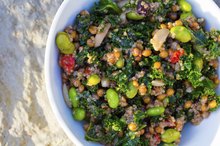Will Certain Vitamins Make Your Eyelashes Grow?
**Your eyelashes have a relatively short growth cycle, lasting for approximately 30 to 45 days, according to Dr. Beth Ann Ditkoff, author of “Why Don’t Your Eyelashes Grow 2? Curious Questions Kids Ask About the Human Body.” Toxins, allergic reactions, eye infections, a thyroid problem, constant eye rubbing, sun radiation, medical conditions and certain medications can contribute to eyelash breakage and prevent eyelash growth 2. The rate that your eyelashes grow is predetermined by genetics, but certain nutrients might support eyelash growth.
Vitamin B-3
Vitamin B-3, also known as niacin, stimulates eyelash growth, eliminates dry and brittle eyelashes, improves blood flow to your hair follicles, aids in cellular reproduction, prevents your eyelashes from falling out and helps your body metabolize keratin, a protein that supports hair growth, according to Abram Hoffer, author of “Feel Better, Live Longer with Vitamin B-3.” Foods rich in vitamin B-3 include:
- beef liver
- salmon
- tilapia
- tuna
- sunflower seeds
- peanuts
- mushrooms
- asparagus [1](# 'inline-reference::“Feel Better
- Live Longer with Vitamin B-3”; Dr
Abram Hoffer; 2007').
Vitamin C
What Vitamins Help Your Fingernails Grow?
Learn More
Foods rich in vitamin C include:
- cranberries
- cauliflower
- broccoli
- Brussels sprouts
- pineapples
- oranges
- tomatoes
- grapefruits
- kale
- strawberries
Vitamin E
Foods rich in vitamin E include:
- almonds
- hazelnuts
- kale
- spinach
- sunflower seeds
- safflower oil
- blueberries
- peanut butter
- avocados
Vitamin H
Natural Herbal Treatments and Vitamins for Cervical Cancer
Learn More
Vitamin H, also known as biotin, encourages eyelash growth, increases blood flow to your hair follicles, thickens your eyelashes, prevents your eyelashes from drying and falling out, improves the condition of your eyes and eyelashes, and helps your body absorb nutrients such as fats, amino acids and carbohydrates, which are needed to stimulate and maintain healthy eyelashes, according to Alan Pressman, author of “Pocket Idiot's Guide to Vitamins.” Foods rich in vitamin H include:
- soybeans
- bananas
- mushrooms
- sardines
- eggs
- walnuts
- beans
- black-eyed peas
- nut butters [4](# 'inline-reference::“Pocket Idiot's Guide to Vitamins”; Alan H
Pressman; 1999').
Calcium
Related Articles
References
- “Feel Better, Live Longer with Vitamin B-3”; Dr. Abram Hoffer; 2007
- “Why Don’t Your Eyelashes Grow? Curious Questions Kids Ask About the Human Body”; Dr. Beth Ann Ditkoff; 2008
- “Burgerstein's Handbook of Nutrition: Micronutrients in the Prevention and Therapy of Disease”; Dr. Michael Zimmermann; 2001
- “Pocket Idiot's Guide to Vitamins”; Alan H. Pressman; 1999
- “Vitamins and Minerals Demystified”; Steve Blake; 2007
- “Vitamin C”; Dr. Charles Alan Blake Clemetson; 1989
- Rossi A, Fortuna MC, Caro G, et al. Chemotherapy-induced alopecia management: Clinical experience and practical advice. J Cosmet Dermatol. 2017;16(4):537–541. doi:10.1111/jocd.12308
- Kim YJ, Chung JK. Bilateral Eyelid Contact Dermatitis and Toxic Conjunctivitis due to Acrylate-Containing Glue. Ann Dermatol. 2014;26(4):543–544. doi:10.5021/ad.2014.26.4.543
- Allergan, Inc. LATISSE: Highlights of Prescribing Information. Updated July 2017.
Writer Bio
R. Y. Langham served as a senior writer for "The Herald" magazine from 1996-99. Langham holds a Bachelor of Arts in English from Fisk University, a Master of Science in marriage and family therapy from Trevecca Nazarene University and a Ph.D in family psychology from Capella University. Dr. R.Y. Langham published her first psychological thriller in September 2011. It can be purchased on Amazon.com, Barnes&Noble.com and Lulu.com.









